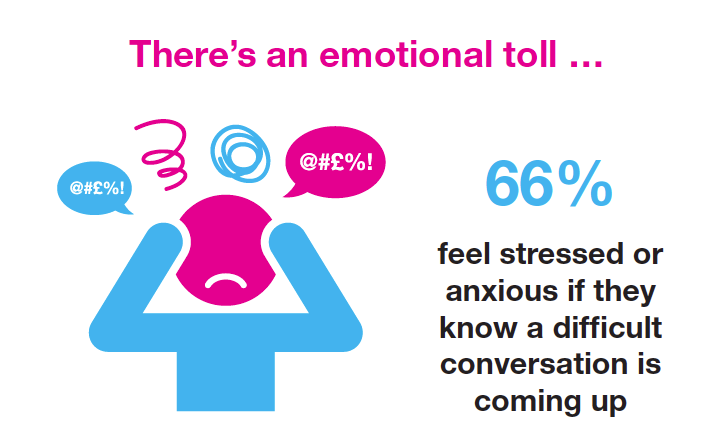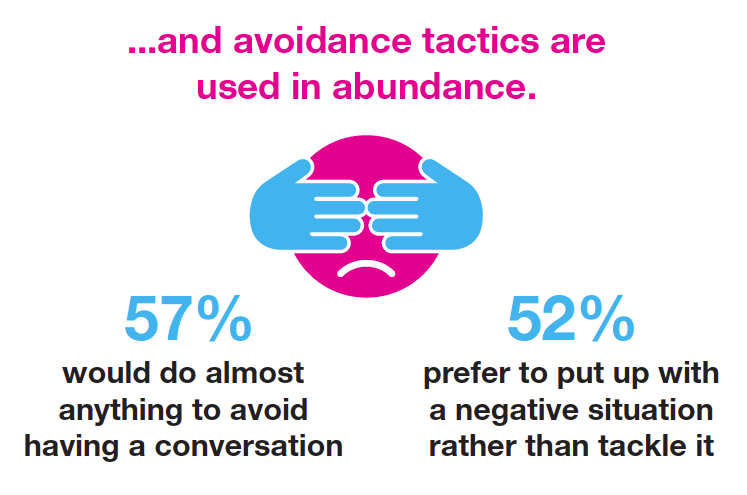The best strategies for difficult workplace conversations
Wednesday 29 July 2015
Difficult workplace conversations are taking a heavy emotional toll on business leaders, according to new CMI research.
Surprisingly, the research found that Brits find it harder to ask their boss for a pay rise than dump a partner, and also revealed some interesting insights into the psychological impact of an impending difficult conversation.
Two-thirds of the 2,000 workers surveyed said they were stressed or anxious if they knew a difficult conversation was coming, while 11% said they suffered from nightmares or poor sleep in the build-up to a difficult work conversation.

What Are The Five Main Causes Of Fear?
- Not knowing how the other person will respond – 43%
- Not being able to get a point across clearly – 31%
- Being in a confrontational situation – 29%
- Getting upset or emotional – 29%
- The other person getting upset or emotional – 21%
Despite the prevalence of such conversations in the workplace, 80% said they had had no formal training on how to tackle them.
As a result, 43% of senior managers admit to losing their temper and shouting when placed in a difficult conversation, while 40% have admitted to panicking and telling a lie.
The survey also revealed that 57% of respondents said they would do almost anything to avoid a difficult conversation; and 52% said they would rather put up with a negative situation at work than have to talk about it.
Wilton said that organisations needed to address these difficulties head-on as such issues affect all employees.
“At CMI we want to help the UK’s workforce to feel calm, and in control,” she said. “That’s important whether you’re negotiating a pay rise with your boss, or talking to a colleague about their performance not hitting the mark. Managers are the lynchpin of so many businesses that they are often at the centre of these discussions.
“And it’s not just the most junior or newest managers we want to help. This is an issue that cuts across all areas and levels of business.”

Remember To Talk
To help managers deal with difficult conversations in the workplace, CMI has come up with a mnemonic to help business leaders navigate such meetings with their staff – TALK.
“It’s scandalous that so many people would rather be miserable at work than face a difficult conversation,” Wilton said. “This reluctance to talk things through not only has a negative impact on individuals, but can quickly affect wider team morale. That’s why CMI is here to help. Our top tips are easy to remember using the mnemonic TALK:
- T – Think about framing how you think about the conversation differently. Don’t label it as ‘difficult’. It may be about a tricky subject but, by suggesting solutions or alternatives, you can focus on constructive outcomes
- A – Always use clear, simple and neutral language. Refer to specific examples and facts
- L – Listen to what the other person is saying and hear their point of view. Show you care about how they see things
- K – Keep the focus on the issue, not the person
“By remembering to ‘TALK’ everyone can have more constructive conversations at work, whether you’re the boss, or a brand new manager.”
All data is taken from a One Poll survey of 2,000 UK respondents run between 11th and 13th May 2015.
Saving lives with NHS Chartered Managers
CMI Chartered Manager accreditation is improving outcomes throughout Royal Berkshire NHS Foundation Trust.
Building careers through lower-level apprenticeships
Read about Skillwise, a private training provider that helps employers to invest in their managers through CMI EPA.
“I’m a big fan of educating myself as much as possible”
Carl Nielsen ChMC says becoming Chartered allowed him to reflect on his strengths, weaknesses and identify areas for growth
Can AI play a meaningful role in developing and nurturing human talent?
How businesses can harness AI’s potential while addressing ethical challenges
Article
Our extensive range of articles are designed to keep you in the loop with all the latest management and leadership best practice, research and news.
Members See More
CMI Members have access to thousands of online learning and CPD resources. Learn more about our membership benefits
Join The Community
CMI offers a variety of flexible membership solutions, tailored to your needs. Find out more and get involved in the CMI community today.
